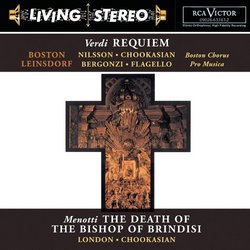| All Artists: Verdi, Menotti, Schoenberg, Leinsdorf Title: Verdi - Requiem & Menotti - The Death of the Bishop of Brindisi Members Wishing: 0 Total Copies: 0 Label: Sony Classics Release Date: 9/11/2001 Album Type: Original recording remastered Genre: Classical Styles: Opera & Classical Vocal, Historical Periods, Early Music, Modern, 20th, & 21st Century Number of Discs: 2 SwapaCD Credits: 2 UPC: 090266374724 |
Search - Verdi, Menotti, Schoenberg :: Verdi - Requiem & Menotti - The Death of the Bishop of Brindisi
 | Verdi, Menotti, Schoenberg Verdi - Requiem & Menotti - The Death of the Bishop of Brindisi Genre: Classical
|
Larger Image |
CD Details |
CD ReviewsOh my, oh my. Luxie P. | Brooklyn, NY United States | 11/03/2004 (5 out of 5 stars) "Though I originally bought this specifically for the Verdi Requiem, and it has its moments (Most specifically Carlo Bergonzi in the tenor role - can I just say that his Hostias and Ingemisco are swoon-worthy?), the real treasure on this album is the only available recording of "Death of the Bishop of Brindisi" I've ever seen. I will admit that the first few times I heard it, I didn't think much about it, or really care for it, but one day I really sat down and LISTENED to it, and it made me cry. The story is compelling - it's the tale of the Bishop of Brindisi on his death bed, recalling the ill-fated children's crusade and his part in their death. Though fictionalized, there are some elements of true history in it, but the "what if" factor is what's most inviting. What if the Bishop HAD felt personally responsible for not being able to prevent them from taking to the sea? One can only imagine the guilt and angst the real Bishop would have felt! The piece itself is a dramatic oratorio, similar in style to Stravinsky's Oedipus Rex. The players are the bishop, a nun who assist at his bedside while he is dying, and SATB and children's choruses. Through flashbacks, we realize that the Bishop, though he tries to stop them and talk them into staying, in the end was bedazzled by the faith and piety of the children and gave them his blessing. After leaving in boats, a great storm arises, sending the children to their graves. Now, their ghosts come to haunt the Bishop as he's dying. The music is mostly tonal, but definately 20th century, and dissonance is used to great effect. The children's chorus singing an "Ave Maris Stella" as the sail off is devastatingly, heart-breakingly sweet. The nun's counterpoint of "Requiem aeternam" to the Bishop's pleas for enlightenment and his bitterness at feeling alienated by God, trying to lead his flock but being unguided himself, is intensely dramatic. Though it may take some listening to get into it, it's a wonderful work that is worthy of being mainstream. I can't recommend this recording enough!" Excellent Verdi and Menotti Robert Sorrentino | Cherry Hill, N.J. | 02/16/2005 (5 out of 5 stars) "Along with the classic Toscanini and Reiner recordings, this is probably the best recording of the Verdi Requiem I have heard. While Leinsdorf has had his detractors, particularly during his Boston period, he aquits himself nobly here, with his skillful handling of orchestra, soloists, and chorus throughout. And what soloists! Bergonzi, as has been pointed out in other posts, brings a rarely-heard beauty to the tenor part, and Flagello could scare any sinner with the way he sings "mors," an octave lower each time, in the Dies Irae. But the real suprise is Nilsson. Apart from her Turandot, Aida, and Minnie, hers was not a voice much associated with the Italian repertoire. You'd never know it here, however, and I defy any Italian soprano to handle the part better. But that's only part of the package. Also heard here, and unavailable in any form since it was initially released in 1964, is the Leinsdorf/BSO recording of Menotti's rarely performed "Death of the Bishop of Brindisi," with the part of the Bishop sung by the incomparable George London. His handling of the part of the tormented Bishop could break your heart, as it does with me everytime I listen to it. As a man dying in torment and fear because of the children he unwittingly sent to die, he is utterly believeable. This is a true singing actor at his best. Finally, what an odd, sad, ironic coincidence it is that one of the best recordings of the Verdi Requiem should have been re-released on the darkest day in U.S. history: September 11, 2001." Investment quality, not just for the 'Requiem'... Frank C. Adams | Boston | 05/05/2006 (5 out of 5 stars) "People will undoubtedly be interested in this 'Requiem' if only because of Nilsson (though she did not sing the concert performances it was based on). She is in her prime, as are all the soloists. The BSO is in top form and totally responsive to Leinsdorf's direction, which seem to to me to be more in the vein of Reiner than Guilini. BUT...there'e more.
'The Death of the Archbishop of Brindisi' is a real treasure. A sort of operatic cantata, it defies description, but is powerful and moving as others have noted. George London fully justifies his legendary status, but the real revelation to me was Lili Chookasian, an extraordinary voice (in the 'Requiem too) that is grossly underappreciated. If there is any doubt, listen to the closing work: 'Song of the Wood Dove' from Gurreleider: early Schoenberg in full Wagnerian glory. Follwing the beautiful orchestral interlude, Chookasian delivers gloriously. And finally, the RCA engineers have captured the sound of Symphony Hall putting many later attempts by others to shame. " |

 Track Listings (16) - Disc #1
Track Listings (16) - Disc #1